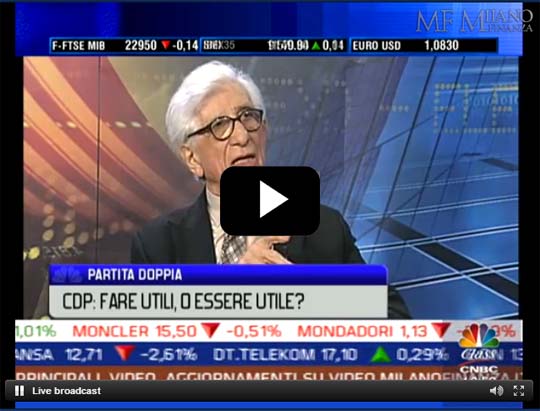
Sir,
No doubt, “if Greece does fall out of the euro, it will also fall out of Europe”, as Philip Stephens writes (“Europe faces more than a Greek tragedy”, April 10). No doubt, “the failure of the euro would mark the failure of Europe”. But there is no link between the two statements, namely that Greece falling out of the euro marks the failure of the euro. This would be the case should it happen for economic reasons: too high the cost, too vague the reforms, too big the risk. As a consequence the euro would not be perceived any more as a monetary union, but as a fixed exchange rate area, the markets would soon attack the weakest countries, the spread would rise, sooner or later there would be a second Greece.
leggi il resto ›

by Philip Stephens
The pilgrimage of Greek prime minister Alexis Tsipras to Moscow told a tale of two tragedies. One, perilously close to the denouement, is about Greece’s uncertain place in the family of European nations; the other, still unfolding but with a storyline that foretells a calamitous final act, is about the future not just of the euro but of European integration.
Predictably enough, the Greek prime minister was feted by Vladimir Putin. The Russian president’s revanchist aggression in Ukraine has left his regime more vulnerable than anyone in the Kremlin would dare admit. Mr Putin badly needs to weaken the EU sanctions regime. Shared Orthodox Christianity, an air of leftist nostalgia in Athens and, above all, Greece’s desperate isolation make it an ideal target for Moscow’s strategy of divide and rule.
It is harder to see what Mr Tsipras gains beyond a few warm words to cheer his supporters at home. The promise of a gas pipeline years hence? Any aid on offer from Moscow would be minuscule relative to funds from the EU and the International Monetary Fund. There is nothing Mr Putin could do that would make leaving the euro any less painful.
The other day I heard Yanis Varoufakis explain how Greece had ended up here. The finance minister’s is a story fluently told — of US backing for the colonels, of the havoc wreaked on industry by the free trade rules of the EU, of the Brussels funding that bankrolled clientelist politics in Athens and of how cheap euros created a ruinous bubble.
There are elements of truth in this; and Mr Varoufakis is right when he says the present debt burden is unsustainable. Missing from the narrative, though, is any sense that Greece must make its own choices. That, whatever the sins of others, only Athens can decide whether Greece prospers as a modern democracy or whether it slips back into the shadows of the Balkans.
The omission, and the implicit rebuke to outsiders who do not feel bound by ballots cast by Greeks, is at the heart of what so frustrates Athens’ partners. This is not just about the Germans, even if Wolfgang Schäuble, Berlin’s finance minister, foolishly lends credibility to the idea. Mr Tsipras is isolated among fellow debtors as much as creditors. What unites them is a demand that Athens produce a plausible plan to reform the Greek state — to modernise its administration and politics as much as its economy. Such a plan would transform the mood of negotiations.
Mr Putin’s preference is otherwise. A collapse in Greek living standards would leave it ripe for the coercion and subversion that are Russia’s trademarks in an effort to expand its influence and control in southeastern Europe. The Russian president already has Hungary’s prime minister Viktor Orban in his breast pocket. His agents are working hard — exploiting Russia’s energy monopoly, buying politicians, bribing officials and taking stakes in financial institutions — to promote instability across the Balkans.
Yet talk to finance ministers and central bankers across the rest of Europe and the mood is one of fatalism. They will tell you that the eurozone would withstand Greece’s departure. This is not 2008, or even 2012, they say. Governments have put in place the mechanisms to deal with crises. Some sound as if they believe that, freed from the vicissitudes of Greek politics, the euro would be stronger in the long run.
In a narrow sense they may be right, though I would not bet on it. But Greece is a distorting prism. Its sequential crises have bred complacency by distracting from the profound structural flaws and political challenges that still imperil the euro. Making monetary union work demands more than proficient crisis management.
Spring has seen a burst of sunshine in the European economy. The European Central Bank’s quantitative easing is having an effect. Growth has picked up a little. Yet it is a delusion to think that the euro is in safe harbour. Fiscal and financial union are at best half-completed, and the political threat to the euro continues to grow.
National politicians refuse to admit the supranational imperatives of the project they are pledged to safeguard. And a return to growth rates of 1 or even 2 per cent will not be enough to restore the euro’s legitimacy among the angry voters who are turning to populist movements of right and left.
In 2012, European leaders defied the markets by summoning up the political resolve needed to save the single currency. They have since lost the will to sustain it. Greece may not bring down the euro; the existential threat lies in the more generalised failure of nerve and leadership.
So it is, too, in the relationship with Moscow. The biggest danger to Europe comes not from the forays of Mr Putin’s rusting aircraft carrier, or his cold war-vintage nuclear bombers, or from Soviet-style subversion in some of the darker corners of the continent.
No, the real weakness lies in a European mindset that prefers to temporise and equivocate than to confront Mr Putin head on. Mr Tsipras’s visit may have held up a mirror to Greece’s troubles. But it also offered a reflection of diffidence and division across Europe. If Greece does fall out of the euro it will also fall out of Europe. And the failure of the euro would mark the failure of Europe. What unites these twin tragedies is the stubborn reluctance of the authors to rewrite the endings.
![]()
di Franco Debenedetti e Nicola Rossi
Promuovere oggi in Italia un nuovo capitalismo di stato è paradossale. Come se un bulimico vedesse nei farmaci dimagranti l’origine dei suoi mali.
Se l’Italia avesse un’Alta Commissione Piani e Programmi, il suo presidente lamenterebbe sulle pagine dei principali quotidiani nazionali il “tradimento del capitale” e ricorderebbe che “ormai da un lustro ogni volta che viene posta sul mercato dei diritti di proprietà una grande impresa italiana nessun investitore italiano si fa avanti”. Sarebbe, anzi – come vedremo – è uno sconcerto comprensibile. L’idea che il mondo non si conformi alle prescrizioni dell’Alta Commissione Piani e Programmi deve apparire intollerabile al suo presidente.
leggi il resto ›
![]()
Caro direttore,
per ricordare, con Giuseppe De Rita, quanti «per anni hanno sostenuto che la debolezza del sistema Italia (venga) dal prevalere della piccola dimensione» ( Corriere di ieri) non è necessario avere buona memoria: lo si legge ancora oggi, ogni volta che un pezzo importante del nostro sistema industriale viene «svenduto». Ultimamente la vendita di Pirelli è stata per alcuni pretesto per teorizzare la necessità del ritorno dello Stato azionista, che, per interposta Cassa Depositi e Prestiti, surroghi quello che viene giudicato un tradimento del capitale.
![]()
di Giuseppe De Rita
La generazione di laureati cui appartengo, quella che cominciò a lavorare intorno agli Anni 60, coltivava il sogno di entrare all’Iri o alla Cassa per il Mezzogiorno, in Olivetti o in Montecatini, luoghi di ricca articolazione organizzativa, che garantivano alta e gratificante professionalità (non a caso in essi si è formata una buona parte della classe dirigente degli ultimi decenni). Quei luoghi non ci sono letteralmente più.La generazione successiva, quella che ha cominciato a lavorare a metà degli Anni 80, ha invece coltivato il sogno di andare nelle grandi banche o nelle grandi sedi di intermediazione finanziaria nella convinzione che solo in esse si poteva sperare in una ascendente mobilità professionale. Oggi quella prospettiva è declinata, se è vero che anche grandi banchieri propendono al lavoro in proprio o al trasferimento di uffici e famiglia a Londra.Alla fine, paga il conto la generazione di laureati che oggi vogliono entrare nei piani alti del mercato del lavoro. Essa è più solida in termini di anni standard di educazione, anche post-muniversitaria; ma trova aziende e istituzioni «rinsecchite» (per concentrazione di business e/o per spending review) e quindi carenti di una articolazione organizzativa capace di accogliere e valorizzare i giovani. Ai quali resta o l’avventura del lavoro autonomo o più ancora l’avventura di andare all’estero, nel rimpianto di chi parla di esodo dei talenti e nello sconcerto di chi ritiene che cediamo ad altri un capitale umano creato dalle famiglie e dalle istituzioni italiane.È il frutto della globalizzazione, per carità; ma è anche il risultato di un sistema (di imprese e di istituzioni) che ha decostruito le strutture manageriali più complesse senza sostituirle con altre di pari spessore, così creando dei «vuoti» certo non attrattivi per giovani con un po’ di ambizione.Converrà allora cominciare a pensare che la crisi più grave non si esplica nei livelli medio-bassi del mercato del lavoro, ma nei piani alti, quelli della professionalità alta, delle strutture organizzative di grande dimensione (private e pubbliche, aziendali ed istituzionali) che pagano il decadimento delle funzioni dirigenziali e degli organigrammi ad esse preposti, e che quindi non hanno vitalità e spazi per giovani di buon livello, ormai neppure per mantenere al lavoro i dirigenti anziani destinati a diventare «esodati». Una crisi dura ed inattesa, su cui non abbiamo adeguate strategie di fronteggiamento. Ed allora vale la pena di ripartire dalla denuncia netta e chiara del «tradimento dei grandi» (aziendali e istituzionali) e dei loro chierici. Per anni hanno sostenuto che la debolezza del sistema Italia veniva dal prevalere della piccola dimensione; si dilettavano a dire che «il piccolo non è bello»; guardavano con una certa albagia quel «popolo di nani» che pure è la componente dominante della nostra realtà d’impresa.Sostenevano a parole l’esigenza di sviluppare dimensioni organizzative sempre più complesse e competitive, ma nei fatti non hanno saputo far crescere i soggetti, l’organizzazione, i quadri dell’operare in grande. E adesso una parte di loro resta in silenzio svicolando dal problema, ed una parte addirittura sceglie una «piccola avventura» personale.Allora, ci salveranno i tanto bistrattati nani. È già successo, negli Anni 70, che il progressivo declino delle grandi dimensioni di impresa sia stato compensato dalla moltiplicazione delle piccole imprese, spesso addirittura sommerse. Ma oggi i livelli di competizione internazionale e tecnologica sono tali da non permettere grandi spazi ai piccoli imprenditori; occorre allora un complessivo salto di qualità del sistema puntando allo sviluppo di nuova cultura manageriale, di nuovi assetti aziendali, di nuovi modelli di organigrammi organizzativi, di nuove procedure decisionali, nuovi canali di comunicazione, in un periodo di una nuova complessità della governance. Ed è questo, forse, l’unico modo per dare sostanza al vecchio termine di «politica industriale»: non disperdersi in strategie di settore, ma concentrarsi su un solo fattore, il rinnovamento della cultura organizzativa, quello dei vertici delle aziende, dei gruppi d’impresa, delle istituzioni economiche.
Cassa depostiti e prestiti investe, rileva quote azionarie, indirizza l’economia di sistema. Ma chi la controlla? E chi decide come e dove investire?
A Partita Doppia ne parlano Franco Debenedetti, Luigi Guiso, Luca Martinelli, Massimo Mucchetti e Giulio Sapelli.







